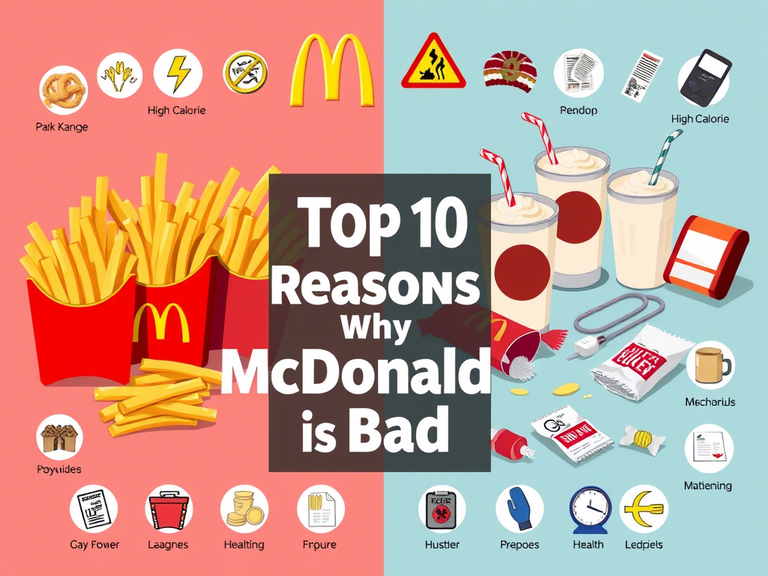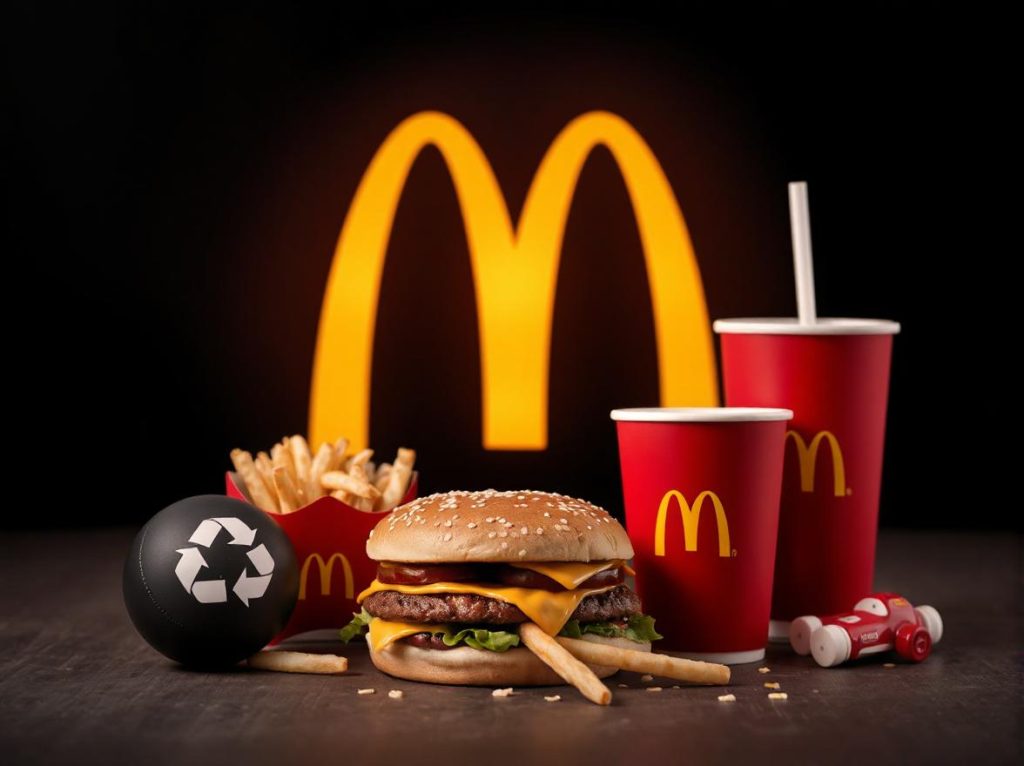Top 10 Reasons Why McDonald’s Is Bad for You
The Allure of McDonald’s and Its Hidden Downsides
McDonald’s is a global fast-food giant that has captured the hearts (and stomachs) of millions. With its golden arches symbolizing convenience, affordability, and indulgence, it’s no wonder so many people flock to its restaurants daily. Whether it’s the crispy fries, juicy burgers, or sugary milkshakes, McDonald’s offers comfort food that satisfies cravings in an instant. However, beneath the surface of this beloved brand lies a host of concerns that have sparked debates about its impact on health, society, and the environment.
In this article, we’ll explore the top 10 reasons why McDonald’s is bad, shedding light on critical issues ranging from nutritional pitfalls to ethical dilemmas. By understanding these factors, you can make more informed choices about your diet and lifestyle while also gaining insights into broader societal implications. So, let’s dive in and uncover what makes McDonald’s a controversial player in the world of food.
Reason #1: High Calorie Counts and Unhealthy Ingredients
One of the most glaring issues with McDonald’s menu is its high calorie counts and reliance on unhealthy ingredients. A single meal at McDonald’s can easily exceed the recommended daily intake of calories, fats, and sodium. For instance, a Big Mac contains around 540 calories, while a large order of fries adds another 510 calories. Pair that with a sugary soda, and you’re looking at over 1,000 calories in one sitting—more than half of what an average adult needs in a day.
Moreover, many items are loaded with trans fats, saturated fats, and artificial additives designed to enhance flavor and extend shelf life. These ingredients contribute to weight gain, heart disease, and other chronic conditions when consumed regularly. While McDonald’s has made efforts to introduce healthier options like salads and grilled chicken sandwiches, these items often come with hidden pitfalls such as excessive dressings or sauces that negate their benefits.
If you’re trying to maintain a balanced diet, it’s crucial to be mindful of portion sizes and ingredient lists. Opting for smaller portions or skipping high-calorie extras like cheese and bacon can help mitigate some of the negative effects.
Reason #2: Excessive Sodium Content
Another major concern with McDonald’s food is its sky-high sodium levels. Sodium plays a key role in preserving processed foods and enhancing taste, but consuming too much can lead to serious health problems. According to dietary guidelines, adults should limit their sodium intake to less than 2,300 milligrams per day. Yet, a single Quarter Pounder with Cheese clocks in at 1,100 milligrams of sodium—nearly half the daily limit! Add a side of fries and a soft drink, and you’ve likely surpassed your sodium needs before lunchtime.
Excessive sodium consumption has been linked to hypertension (high blood pressure), which increases the risk of heart attacks, strokes, and kidney damage. It can also cause water retention, leading to bloating and discomfort. To reduce your sodium intake, consider swapping salty sides like fries for apple slices or opting for unsalted beverages instead of sodas. Additionally, checking the nutritional information online before ordering can help you make smarter choices.
Reason #3: Processed Foods and Artificial Additives
McDonald’s heavily relies on processed foods and artificial additives to achieve consistent flavors and textures across its vast network of locations. From preservatives in buns to artificial colors in shakes, these additives raise concerns about long-term health effects. Some studies suggest that certain additives, such as nitrates and phosphates, may increase the risk of cancer, inflammation, and metabolic disorders.
For example, Chicken McNuggets contain modified corn starch, sodium phosphates, and dextrose—all ingredients that aren’t typically found in home-cooked meals. Similarly, McFlurry desserts are packed with artificial sweeteners and stabilizers that could disrupt gut health and metabolism. While occasional indulgence might not pose significant risks, frequent consumption of highly processed foods can take a toll on your body over time.
To minimize exposure to artificial additives, try incorporating more whole, unprocessed foods into your diet. If you do visit McDonald’s, choose simpler menu items like plain hamburgers or grilled chicken without heavy sauces.
Reason #4: Environmental Impact
Beyond personal health, McDonald’s operations have a substantial environmental footprint. The company sources billions of pounds of beef, poultry, and potatoes annually, contributing to deforestation, greenhouse gas emissions, and water pollution. Livestock farming, in particular, is a major driver of climate change due to methane emissions from cattle and land degradation caused by grazing.
Additionally, McDonald’s packaging generates massive amounts of waste. Despite recent initiatives to switch to recyclable materials, much of their packaging still ends up in landfills or oceans, harming wildlife and ecosystems. Critics argue that the corporation could do more to address these issues by adopting sustainable sourcing practices, reducing plastic use, and promoting plant-based alternatives.
Consumers can play a role in mitigating this impact by supporting eco-friendly policies, bringing reusable cups or containers, and choosing vegetarian or vegan options when available. Every small action counts toward creating a greener future.
Reason #5: Ethical Concerns About Labor Practices
McDonald’s supply chain has faced scrutiny for unethical labor practices, including low wages, poor working conditions, and exploitation of workers. Many employees at both corporate-owned and franchise locations report earning minimum wage despite working long hours. This lack of fair compensation makes it difficult for workers to support themselves and their families, perpetuating cycles of poverty.
Furthermore, investigations have revealed instances of child labor and unsafe working environments in supplier factories abroad. These findings highlight the need for greater transparency and accountability within the industry. As consumers, we can advocate for better labor standards by supporting campaigns for fair wages, unionization, and improved workplace safety measures. Choosing brands that prioritize ethical practices sends a powerful message to corporations like McDonald’s.
Reason #6: Marketing Tactics Targeting Children
McDonald’s aggressive marketing strategies targeting children have drawn widespread criticism. Brightly colored ads featuring Happy Meals, toys, and cartoon mascots appeal directly to young audiences, encouraging them to associate fast food with fun and happiness. Research shows that children exposed to such advertisements are more likely to develop unhealthy eating habits early in life, increasing their risk of obesity and related diseases.
Critics argue that this practice exploits children’s vulnerability and undermines parental authority. In response, some countries have implemented regulations banning fast-food ads during children’s programming. Parents can counteract these influences by setting boundaries around screen time, teaching kids about nutrition, and modeling healthy eating behaviors. By fostering open conversations about food choices, families can empower children to make informed decisions.
Reason #7: Contribution to Obesity Epidemic
Fast food chains like McDonald’s have played a significant role in fueling the global obesity epidemic. Their menus are dominated by calorie-dense, nutrient-poor foods that encourage overeating. Combined with sedentary lifestyles and limited access to fresh produce in underserved communities, this creates a perfect storm for rising obesity rates.
Studies show that individuals who frequently consume fast food tend to weigh more and have higher BMIs compared to those who don’t. Obesity, in turn, increases the likelihood of developing type 2 diabetes, cardiovascular disease, and certain cancers. Addressing this issue requires systemic changes, including stricter regulations on fast-food marketing, improved access to affordable healthy foods, and public education campaigns. On an individual level, being aware of portion sizes and balancing indulgences with nutritious meals can help prevent weight gain.
Reason #8: Lack of Transparency in Food Sourcing
Despite claims of “quality” ingredients, McDonald’s has faced criticism for its lack of transparency regarding food sourcing. Consumers often remain unaware of where their food comes from or how it’s produced. For instance, the origins of beef, chicken, and dairy products are rarely disclosed, leaving room for speculation about animal welfare and farming practices.
Some advocacy groups have called for mandatory labeling and third-party audits to ensure accountability. Until then, customers seeking transparency may prefer dining at establishments that openly share information about their suppliers. Supporting local farmers’ markets or cooking at home using traceable ingredients is another way to align your values with your food choices.
Reason #9: Overreliance on Sugary Beverages
Sugary beverages like Coca-Cola and milkshakes are staples of the McDonald’s experience, yet they pose significant health risks. Regular consumption of sugary drinks has been linked to obesity, tooth decay, and insulin resistance. A large Coke, for example, contains approximately 80 grams of sugar—far exceeding the American Heart Association’s recommended daily limit of 25 grams for women and 36 grams for men.
To curb sugar intake, consider ordering water, unsweetened iced tea, or black coffee instead. Alternatively, ask for smaller sizes or skip the beverage altogether. Reducing dependence on sugary drinks not only benefits your health but also supports efforts to combat rising rates of diabetes and other metabolic disorders.
Reason #10: Limited Nutritional Value
Finally, McDonald’s offerings generally lack the nutritional value needed to sustain a healthy lifestyle. Most menu items are deficient in essential vitamins, minerals, and fiber while being high in empty calories. Even seemingly healthier options like oatmeal or yogurt parfaits are often loaded with added sugars and artificial ingredients.
To maximize nutrition, focus on incorporating whole grains, lean proteins, fruits, vegetables, and healthy fats into your diet. When dining out, look for meals that include these components or modify existing dishes to suit your needs. Remember, balance is key—even occasional treats can fit into a well-rounded eating plan if approached mindfully.
Conclusion: Making Informed Choices
While McDonald’s remains a convenient and enjoyable option for many, it’s important to recognize the potential downsides associated with its food and business practices. From excessive calories and sodium to environmental harm and ethical concerns, the top 10 reasons why McDonald’s is bad highlight areas where improvement is needed.
By staying informed and making conscious decisions, you can enjoy fast food responsibly without compromising your health or values. Consider exploring alternative dining options, advocating for policy changes, and educating others about the importance of mindful consumption. Together, we can create a healthier, more sustainable future—one bite at a time.What steps will you take to make better choices moving forward? Share your thoughts below!





